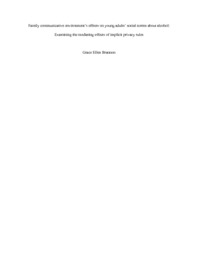
ATTENTION: The works hosted here are being migrated to a new repository that will consolidate resources, improve discoverability, and better show UTA's research impact on the global community. We will update authors as the migration progresses. Please see MavMatrix for more information.
Show simple item record
| dc.contributor.author | Brannon, Grace Ellen, PhD | |
| dc.date.accessioned | 2023-02-10T21:56:40Z | |
| dc.date.available | 2023-02-10T21:56:40Z | |
| dc.date.issued | 2021 | |
| dc.identifier.uri | http://hdl.handle.net/10106/31060 | |
| dc.description.abstract | Alcohol usage among young adults remains a prominent public health concern. Communicating with family members about alcohol can positively influence young adults’ perceptions of social norms, yet the stigmatized nature of alcohol-related conversations in the family create a barrier to occurrence of these conversations. This study examines how young adults’ familial communication patterns impact their descriptive and injunctive social norms about alcohol, using Communication Privacy Management Theory as the theoretical framework. Specifically, this study seeks to understand how conversation orientation, conformity orientation, warm conformity orientation, and cold conformity orientation predicts two sets of social norms (descriptive and injunctive), and to investigate how implicit privacy rules mediates each of these relationships. Implicit privacy rules did fully mediate the relationships between conversation orientation and injunctive descriptive norms about alcohol as well as warm conformity orientation and injunctive descriptive norms about alcohol. | en_US |
| dc.language.iso | en_US | en_US |
| dc.title | Family Communicative Environment’s Effects on Young Adults’ Social Norms about Limiting Alcohol: Examining the Mediating Effects of Implicit Privacy Rules | en_US |
| dc.identifier.doi | https://doi.org/10.1080/10410236.2020.1748819 | |
Files in this item
- Name:
- Family communicative environment’s ...
- Size:
- 306.4Kb
- Format:
- PDF
- Description:
- Family Communicative Environment’s ...
This item appears in the following Collection(s)
Show simple item record


